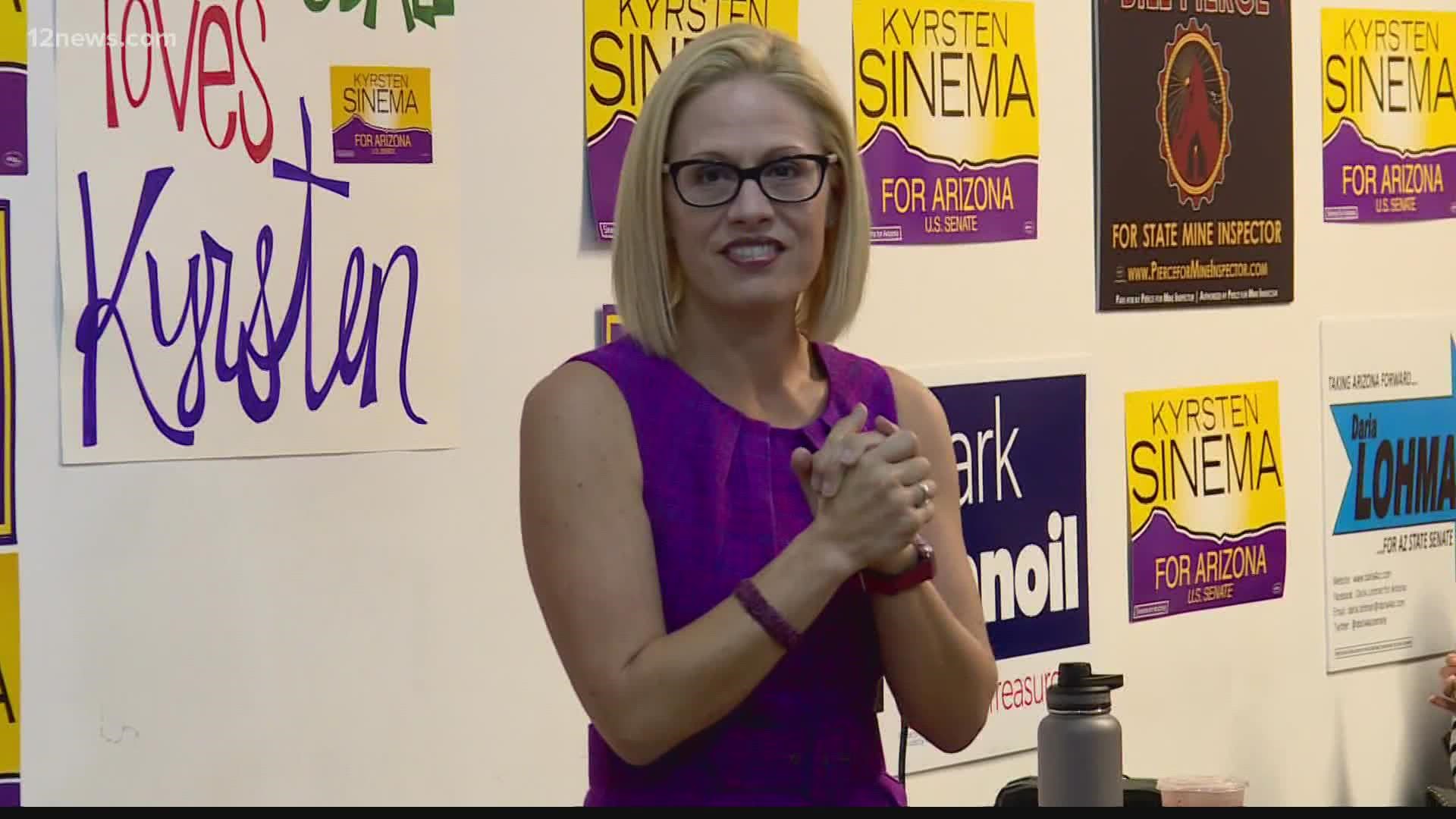PHOENIX — The Arizona Democratic Party on Saturday formally censured U.S. Sen. Kyrsten Sinema for blocking Democrats’ voting-rights legislation in the Senate.
The rebuke leaves open the question of whether the party will support Sinema if she runs for re-election in 2024.
The party’s Executive Board approved the censure ahead of the party’s annual convention Saturday, being held virtually for the second year in a row.
The party chairwoman, State Sen. Raquel Teran of west Phoenix, said in a statement:
“As a party, our job is to support our Democratic candidates, and we appreciate Senator Sinema’s leadership in passing the American Rescue Plan and the Bipartisan Infrastructure Law. However, we are also here to advocate for our constituents and the ramifications of failing to pass federal legislation that protects their right to vote are too large and far-reaching. While we take no pleasure in this announcement, the ADP Executive Board has decided to formally censure Senator Sinema as a result of her failure to do whatever it takes to ensure the health of our democracy.”
Party Put Sinema on Notice
The censure was based on a party resolution last fall that put Sinema on notice.
The resolution warned that if she didn’t vote to reform the U.S. Senate’s filibuster rule to help pass Democrats’ voting-rights legislation, the party’s executive board would have the power to issue a vote of no confidence or issue a formal censure.
Sinema’s vote this week to uphold the Senate’s filibuster rule helped kill the legislation.
Sinema is a co-sponsor of the bills, but she has opposed filibuster reform during her three terms in Congress and now, since 2019, in the Senate.
Sinema Responds to Censure
The senator's office issued a statement responding to the censure:
"During three terms in the U.S. House, and now in the Senate, Kyrsten has always promised Arizonans she would be an independent voice for the state -- not for either political party. She’s delivered for Arizonans and has always been honest about where she stands."
In a Senate floor speech last week, Sinema explained why she wouldn't vote to change the filibuster rule.
“I will not support separate actions that worsen the underlying disease of division infecting our country," she said.
“I am committed to doing my part to avoid toxic political rhetoric, to build bridges, to forge common ground, and to achieve lasting results for Arizona and this country."
Censure a Sign of Expanding Divide
A censure by a political party is a public vote of disapproval but has no impact beyond that.
In Sinema’s case, the censure is just the latest symbol of the widening political breach between the first-term U.S. senator and the state Democratic Party.
A senator who first ran for office 20 years ago as a far-left progressive, Sinema has shunned the Democratic Party label and prominent Democratic candidates during recent campaigns as she's branded herself an independent.
That approach paid off in 2018: Sinema was the first Arizona Democrat elected to the U.S. Senate in 30 years. She owed her victory in part to Republicans who split their ticket in the top statewide races that year.
Less than four years later, there are widespread calls among Democrats to primary Sinema when she comes up for re-election in 2024. Progressive organizations are raising money for a Sinema opponent.
In recent days, Democratic Congressman Ruben Gallego of Phoenix has publicly called out Sinema. Gallego is viewed as a potential opponent in a Democratic primary.
Sinema's emergence as a swing vote in the 50-50 U.S. Senate has given her enormous clout with her party’s agenda.
Sinema’s opposition to reforming the filibuster rule has forced Democrats to obtain 60 votes to pass legislation, not a majority of 51 — a virtual impossibility in a chamber where Republicans are united in opposition to the Democratic agenda.
Sinema's vote in the Senate Wednesday night, along with West Virginia Democratic Sen. Joe Manchin's, ended hopes for reforming the filibuster rules.
Video after the vote showed Republican senators walking up to Sinema to shake her hand.
Sinema's Democratic seatmate in the Senate, Mark Kelly, had announced earlier in the day that he would support a so-called "talking filibuster" only for passage of voting-rights legislation. Kelly is also a co-sponsor of the bills.
That reform would have allowed a simple majority vote to pass the voting rights bills.
GOP censured top officeholders
Party censures of top officeholders are nothing new in recent Arizona politics.
A year ago this week, the Arizona Republican Party used its annual convention to censure Gov. Doug Ducey, former Sen. Jeff Flake and Cindy McCain, the widow of Sen. John McCain.
The rebuke was a sign of the party’s total embrace of former President Donald Trump after his defeat by Joe Biden.
Flake and McCain endorsed Biden. Trump criticized Ducey for certifying Biden’s victory in Arizona.
In 2014, the state GOP censured John McCain, the party’s 2008 presidential nominee. It culminated years of sniping between McCain and a party base that had come to deem his record as “disastrous and harmful.”
Two years later, McCain won the GOP Senate primary and went on to win his sixth and final term in the U.S. Senate.
Arizona Politics
Track all of our current updates with Arizona politics on our 12 News YouTube channel. Subscribe for updates on all of our new uploads.

